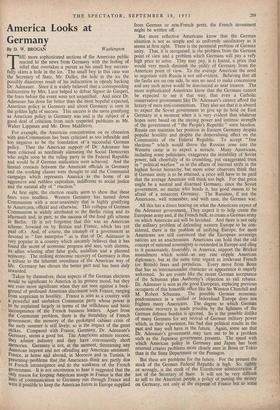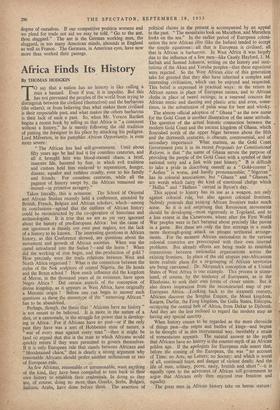America Looks at Germany
THE more sophisticated sections of the American public reacted to the news from Germany with the feeling of relief that overtakes a parent as his small boy success- fully skirts a hole in the ice. The small boy in this case was the Secretary of State, Mr. Dulles, the hole in the ice the possibly disastrous result of his indiscretion in openly backing Dr. Adenauer. Since it is widely believed that a corresponding . indiscretion by Mrs. Luce helped to defeat Signor de Gasperi, the fears before the event were not unjustified. And since Dr.
, Adenauer has done far better than the most hopeful expected, American policy in Germany and about Germany is seen in the golden light of success. This success is the more gratifying as American policy in Germany was and is the subject of a good deal of criticism from such respected publicists as Mr. Walter Lippman and Mr. Drew Middleton.
For example, the American concentration on or obsession with anti-Communism has been criticised as too inflexible and too negative to be the foundation of a successful German policy. Then the American support of Dr. Adenauer has been criticised as needlessly alienating the Social Democrats Who might soon be the ruling party in the Federal Republic and would be if German unification were achieved. And the limited contacts between the American officials in Germany and the working classes were thought to aid the Communist campaign which represents America as the home of an aggressive and ruthless capitalism, indifferent to social justice and the natural ally of " reaction."
At first sight, the election results seem to show that these fears were needless. Western Germany has turned down Communism with a near-unanimity that is highly gratifying to Americans, official and otherwise. This collapse of German Communism is widely attributed to the Berlin rising and its aftermath and, in part, to the success of the food gift scheme in Berlin. (It is not forgotten that this was an American scheme, frowned on by Britain and France, which has yet paid off.) And, of course, the triumph of a government as devoted to " free enterprise " as is that of Dr. Adenauer is very popular in a country which sincerely believes that it has found the secret of economic progress and sees, with distress. its allies whoring after false gods, socialism and a planned economy. The striking economic recovery of Germany is thus a tribute to the inherent soundness of *the American way of life. Germany has chosen the better part and has been duly rewarded.
Taken by themselves, these aspects of the German elections would be significant to 'America in its present mood, but they are even more significant when they are seen against a back- ground of profound American discontent with France, ranging from scepticism to hostility. France is seen as a country with a powerful and unshaken Conimunist party whose power is to be explained largely in terms of the selfishness and basic incompetence of the French business leaders. Apart from the Communist problem, there is the instability of French government; the memory of . the prolonged cabinet crisis of the early summer is still lively; so is the impact of the great strikes. Compared with France, Germany, Dr. Adenauer's Germany, seems a good bet. The Americans admire success; they admire industry and they have conveniently short Memories. Germany is not, at the moment, threatening any American interest and not offending any American, sentiment. France, at home and abroad, in Morocco and in Tunisia, is presenting 'problems that .the Americans think are partly due to French intransigence and to the weakness of the French government. It is not uncommon to hear it suggested that the Only reason for keeping American troops in France is that the lines of communication to Germany run through France and were it posSible to keep the American forces in Europe supplied from .German or non-French ports, the French investment might be written off.
But more reflective Americans know that the German situation is not as simple and as uniformly satisfactory as it seems at first sight. There is the perennial problem of German unity. That, it is recognised, is the problem from the German point of view and a problem which Germans will pay a vefy high price to solve. They may pay, it is feared, a price that would very much diminish the utility of Germany from the American point of view. To the average American the need to negotiate with Russia is not self-evident. Believing that all the faults are on one side, he sees no need to make concessions and any such move would be denounced as near treason. The more sophisticated Americans know that the Germans cannot be expected to see it that way, that even a Catholic conservative government like Dr. Adenauer's cannot afford the luxury of mere anti-communism. They also see that it is absurd to expect the Soviet government to give up its hold on East Germany at a moment when it is very evident that whatever hopes were based on the staying power and intrinsic strength of the government of " the People's Republic " were baseless. Russia can maintain her position in Eastern Germany despite popular hostility and despite the demoralising effect on the Communists of the Federal Republic. To accept " free elections " which would throw the Russian zone into the Western camp is to expect a miracle. Many Americans, including some politicians, exaggerate the instability of Soviet power, talk cheerfully of its crumbling, put exaggerated trust in " political warfare or in the effects of internal strife in the highest Soviet hierarchy, but more sober observers think that if German unity is to be attained, a price will have to be paid that the average American will think too high. For that price might be a neutral and disarmed Germany, since the Soviet government, no matter who heads it, has good reason to be afraid of a renascent Germany. The Russians, if not the Americans, well remember, and with ease, the German war.
All this has a direct bearing on what the Americans expect of the Adenauer government. They expect it to help create the European army and, if the French balk, to create a German army on which American aid will be lavished. And there is not only the military problem of defending western Europe to be con- sidered, there is the problem of unifying Europe, for most Americans are still convinced that the European sovereign nations are an anachronism. Americans can hold that the old concept of national sovereignty is outmoded in Europe and cling to it passionately, feverishly, in America, support the Bricker amendment which would at any rate cripple American diplomacy, but at the same time regard as irrelevant French (or British) fears and prejudices. Every move from Bonn that has an internationalist character or appearance is eagerly welcomed. So are events like the recent German acceptance of the Schuman plan Authority's objection to rail rebates. Dr. Adenauer is seen as the good European, replacing previous occupants of this honorific office like Sir Winston Churchill and M. Robert Schuman. The possible German economic predominance in a unified or federalised Europe does not frighten many Americans. The degree to which German economic recovery is made possible by the lightness of the German defence burden is ignored. So is the possible dislike of many Germans for any revival of German military poWer which, in their experience, has had dire political results in the past and may well have in the future. Again, some see that Dr. Adenauer's government may turn out to be a problem such as the Japanese government presents. The speed with which American policy in Germany and Japan has been reversed, creates problems more clearly seen in Bonn or Tokio than in the State Department or the Pentagon.
But these are problems for the future. For the present the stock of the German Federal Republic is high. So, rightly or wrongly, is the stock of the Eisenhower administration if not of the Secretary of State. It will not be very difficult to sell to the American people a policy of putting the money on Germany, not only at the expense of France but to some degree of ourselves. If our competitive position worsens and we plead for trade not aid we may be told, "Go to the ant, thou sluggard." The ant is the German working man, the sluggard, in too many American minds, abounds in England as well as France. The Germans, in American eyes, have now more than worked their passage.



































 Previous page
Previous page